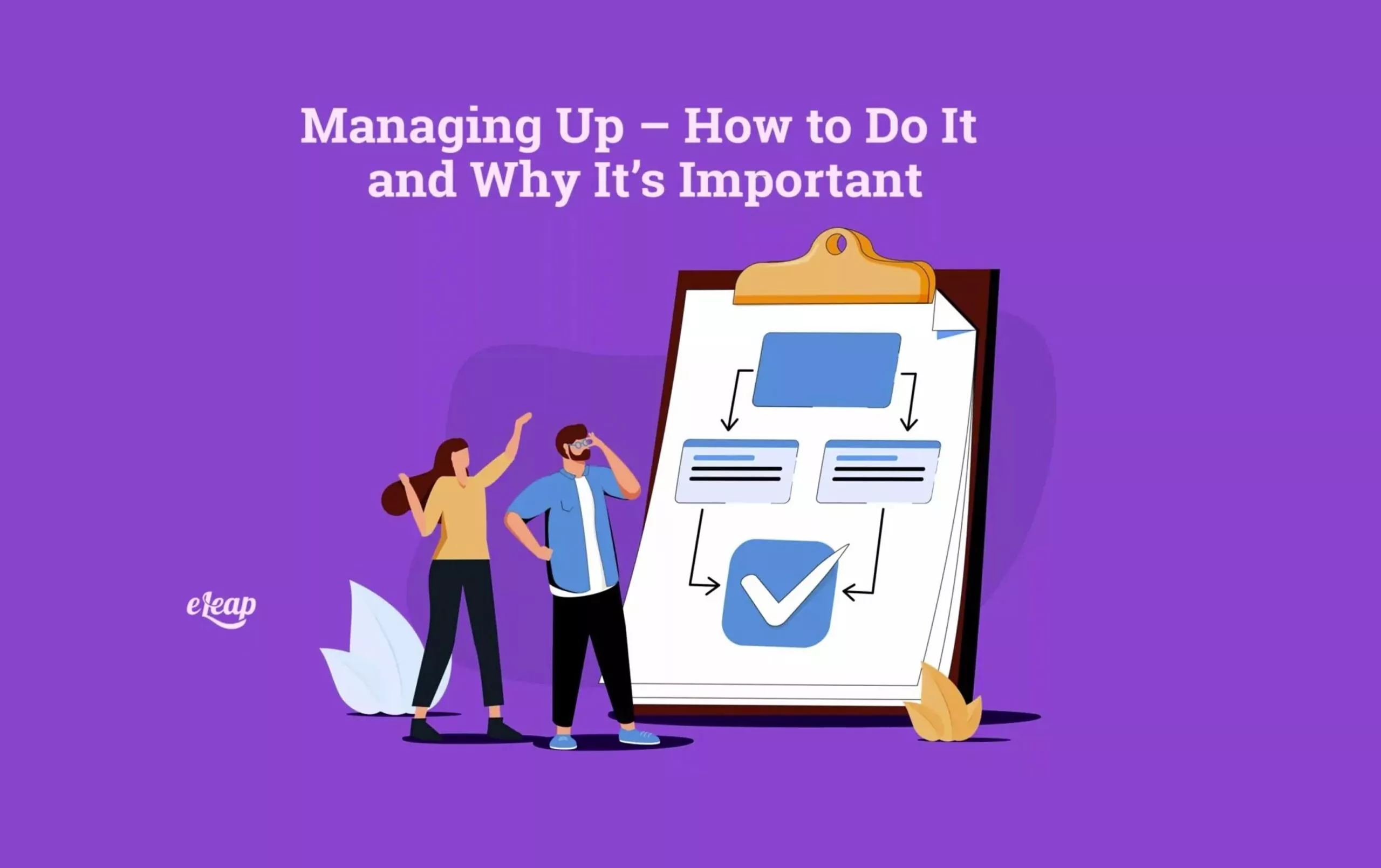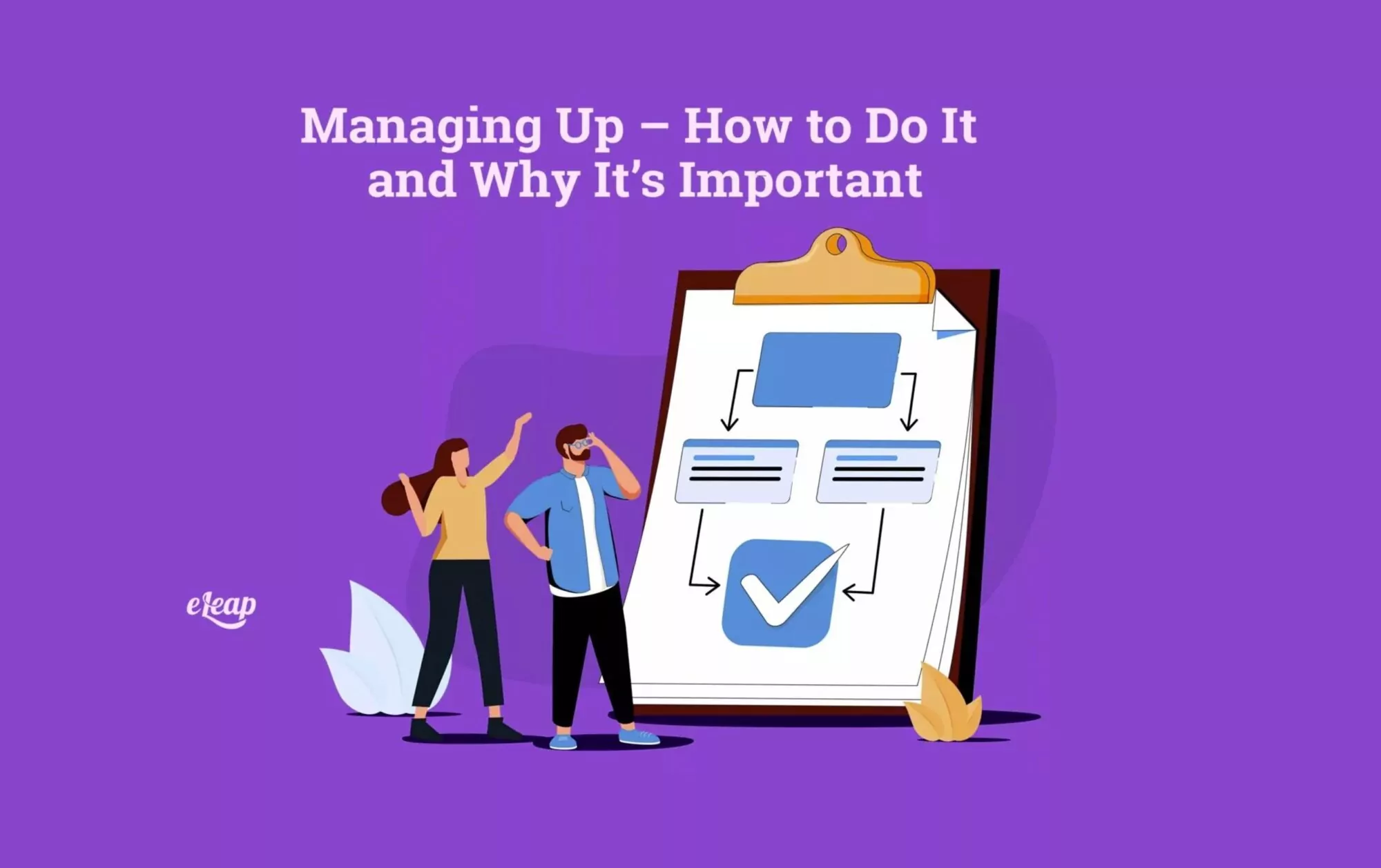Managing Up – How to Do It and Why It’s Important

If you’ve ever had to deal with a difficult situation in the workplace caused or aggravated by a supervisor or boss, you may have been “managing up” to navigate through those circumstances. Most people who have spent any amount of time working might remember a time in which they were dealing with a difficult job or their job was made more difficult by a manager or supervisor. What types of strategies helped you? What strategies did not help?

Managing up can offer numerous benefits to any awkward or unproductive working relationship between employees and supervisors. First, let’s learn a little about what it means.
What is Managing Up?
To “manage up” essentially means to indirectly manage your supervisor through how you perform as an employee. When you have a good manager, you use their traits to bring out the best in you as an employee, and when you have a bad manager, you find a way to use their traits to bring out the best in you as an employee. No matter which type of situation you find yourself in, it’s meant to be mutually beneficial for both you as the subordinate employee and your manager. Managing up means being the most effective employee you can be to bring as much value as you can to your company.
Who Should Manage Up?
Who does managing up apply to? In truth, anyone who works under a supervisor. However, managing up can be particularly advantageous to those working under a brand-new boss they’ve never met before or even a manager they have never seen in person due to different locations or remote working arrangements. Managing up can also be helpful to those working for a boss with insecurity issues or a manager who usually sends mixed messages. Those working under micromanagers or even bosses who are entirely hands-off can benefit from managing up.
How to Manage Up
Managing up involves considering the traits that are characteristic of good managers and not only exhibiting them yourself as an employee but flipping them so that your supervisors also see and feel the effects of such character traits. The following are several areas in which to leverage your own performance with the intention of managing up:
Be Kind and Caring
The first way to manage up is also the first rule of being a decent human being, and that is to be kind and caring. Great managers take the time to get to know their team, and part of being a great employee is to get to know your management and show a genuine interest in who they are as a person as well as their well-being and their professional goals.
Be a Proactive Employee
Don’t be the type of worker who waits for tasks to be delegated to them. Instead, always be looking ahead to the next responsibility relevant to the current team goals. You can take it one step further by learning to anticipate your boss’s needs. No one is a mind reader, but with a little time and consistency working with a supervisor, you will eventually develop a rhythm and a routine for how to go about certain tasks.
Coach and Be Coachable
Another way to manage up is to coach and be coachable. While your supervisor might not necessarily need direct tips or pointers on the trade from you, you can still coach them by providing feedback on their performance as a manager. Communicate the types of things that help you the most on the job, as well as what doesn’t help or what blocks your productivity altogether. The other side of coaching is being coachable. Try to receive feedback from your manager openly and make a visible effort to apply it to your work as soon as possible.
Your supervisor will likely be giving you feedback whether you’re ready for it or not, but sometimes beating them to the punch will reflect on you favorably. Take any opportunity to seek out their help or feedback if you have questions or even if you don’t. Regularly checking in with them will show them that you value their opinion and guidance.
Communication is Key
Managing up also involves establishing good communication between yourself and your supervisors or boss. This can be accomplished by asking them directly how they prefer to give or receive communication or how you can bring them any questions that come up for you while on the job. The exchange of questions or feedback should not be limited to your performance reviews. Open avenues of communication keep everyone on the same page. It’s also important to practice good listening skills when communicating with your manager so that you don’t need to ask more questions than may be necessary.
Transparency is also important in communication. Never keep information from your supervisor, even if you know they won’t like hearing it. Whether it’s related to a hiccup in your job performance or perhaps you are meeting with your supervisor’s supervisor, it’s always important to be transparent and upfront.
Support Personal Development
Personal development support is also a two-way street for managers and subordinates. Just like you have ongoing development goals within your career, your manager likely does as well. As you get to know them, find out what those goals are and brainstorm ways in which you can help them achieve them from within your role in the business.
Exhibit Emotional Fortitude
Emotional fortitude is also important for managing up, especially when your team is frequently dealing with issues that create a lot of tension or put pressure on the team. You must be able to perform efficiently under pressure and find ways to help your manager do the same. In these situations, it can be especially helpful to ask for more responsibility to take some of the pressure off your supervisor and even the rest of the team. Be aware of your limitations when it comes to workloads, but even the smallest way of doing something extra will likely be beneficial to your team.
Encourage Desired Behavior through Positive Feedback
Acknowledging fair treatment from your manager is a way to ensure that type of treatment continues. It may seem Pavlovian, but positive feedback given for a welcomed behavior will reinforce that behavior for your manager, even if it’s subconsciously. They are then more likely to continue that type of fair treatment in the future. Rewarding the type of communication or treatment you want to continue is a way to guarantee that it will.
Be Performance-Driven
If you are working under a manager who is particularly results or performance-driven, then you must be meeting performance standards for your job. This is one way to leverage your performance for the purpose of managing up. If your supervisor has no grounds for complaints when it comes to your productivity, it’s another way to foster a positive working relationship. You can also do whatever you can to support your teammates in their own productivity to increase the success of the team. This will not go unnoticed by a results-driven supervisor.
Share in Technological Familiarity
When it comes to technology in the workplace, your manager might not always have the same experience as you do. Perhaps your manager was hired from outside the company so they aren’t as familiar with the systems you are accustomed to using regularly. A great way to support your manager in these situations is to offer them support in integrating into the new-to-them technologies and making yourself available to answer any questions they may come up with in the learning process.
Reach for Organizational Goals
If your manager has broken down the company or team goals into actionable steps, make sure you communicate to them that you value that structure. Then, contribute to those action steps to the best of your ability. This will help your manager by allowing them to focus on team results and performance numbers while you and the rest of the team focus on the action steps it takes to achieve the goals for the company.
Why Managing Up is Important
While supervisors do have a responsibility to be effective leaders, subordinate employees also have the responsibility to perform to the best of their ability. Nobody is perfect, but employees working under challenging managers are not helpless. They do have the power to influence their working team and even their supervisors for the better by taking responsibility for their own performance on the job.
In Closing
Managing up is an important technique to be aware of when working on any kind of organizational team. There will always be bosses and supervisors to whom any employee must answer. Getting to know your supervisor and how to work with them most effectively by leveraging both your similarities and your differences can help cultivate both great employees and great managers.
The eLeaP continuous performance management system provides organizations with powerful options to attract and retain high-caliber team members.